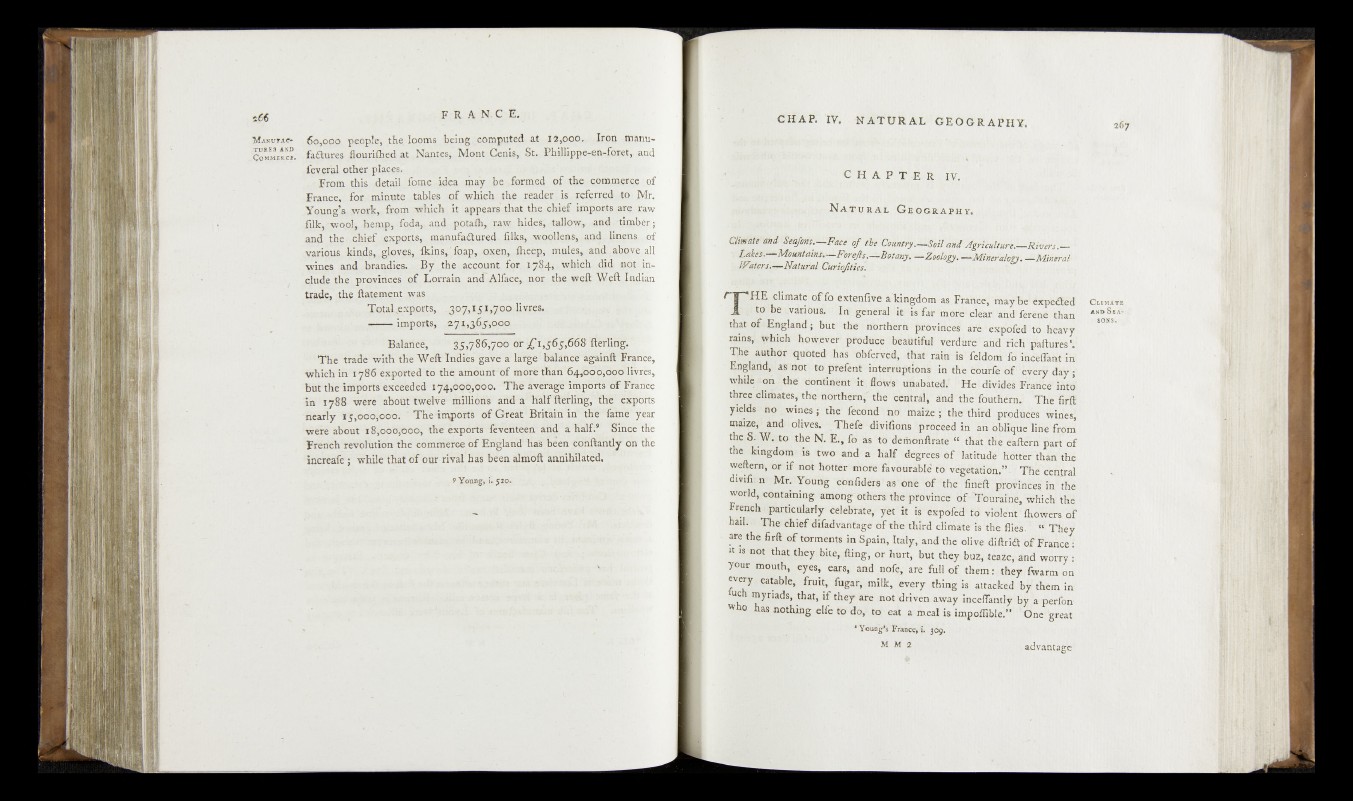
Manumc*
'^rmw a no
C ommerce.
60,000 people, the looms being.^computed- at j 2,000, .Iron m|p,u-
fiuftures flourifhed at . Nantes, Mont Cenis, S t./’BhjUipp.^p,for.et, ,and
lèverai other plac.es. :
From t^his detail.;fome ,-jdea may be-formed of, the , commerce of
France, for minute tables o f which the resader,. is, referred ^ptJVIr.
.Young’s work, from Which it appears' that the chief imports ,are raw
filk-, wocii hemp, fqda, and potafh, raw hides; tallow, and,'|f^n.ber;
and the chief exports, jnanufai^ured. $lk§, «waplleps,,.and b u ^ n ^ of
various kinds, gloves, fkins,'foap, -oxen, Iheep, mqle^ a n d , ab.ovgj.all
wines and brandies. By J:her acçqunt fqr.,1784,..which, did ^.ot^include
the provinces of Lorrain and"Alface, nor the weft \^çft,!ndian
trade, the ftatcment y a s
„397,Total ^exports, x 5 x,y©oslivres.
TFffftTj isoportsf
Balance, 3ƒ,j f f i ,700 or ^-1,5651668'lferlirig*.
T h e trade With the Weft Indies gave a' llfr'gec BhMnce againft France,
which nit: 1786 exported to the am o u n fo f more th ah<64^)oo^oo|yiiyres,
but the imports exceeded 174,000,000. T h e ivjefagS1 import's of France
in 1788 were about twelve millions- and a halflfterlffi^g^'fhfe^lports
n e a r ly ! 5,000,00a. T h e imports o f G re a t1 B ritain in the’Tatne [year
were about 18,000,000, the expbrts fev'ertteen* and a haifl“^ .,'lSmce the
French revolution the commerce of England“has been conftantly on the
increafe; While that o f our rival has been Sdmbft ariniftikted.
9 Youjig, i. 520.
C H A P T E R JV.
N A T U R A L Q e O G R A, P H Y .
Climate' and Safaris:—Pace of M
-, faM .— Mountain^— Por’efts^Bmmfi^Èoellgy. — M^erakrf. 4 ■,
Waters .— Natural Curiofitiès. V
n p H E climate o ffo extenfiye akingdom as.France,1 ih a y ;be<éxpecfted
1 to be (.various. - I n genera! utf-ife far-more* e lâ ir''and ferené than
that o frEngland; but the northern province# arê expofed to ,fc à fy
rains,- which however! R ed u c e beautiful verdhre^’a n d ^ ï^ p a f tù r e à ^
I^he author quoted has 'qbferved, dhat- rMn is ' feldomff ô ^ '|é îk iit in
England, aîTnot'pto prefent interruptions’ in the cburïe o f every dayV
While BOn'the continent it flows' unabated; H e ? divides 'f&Ç&s'
three clirhates, thq-northern^ the centrâî', ahd thè'foWthérn* The firîî
yields • rfo^wines ; ' the f&o'hd>no m a ïz e f t^ th f r 'd # r o d f e 'Wines,
maize, andfel-ives. Thefe divifions .proceed in an obfiqu d W e ’ frdfti
the S. W^,to the N. E., fo as to demohftrate “ th a t'td l'é ifte fh 'p^rl* o f
the; -kingdom- is two and a half degrees o f-‘latitude^ htittreFthan'-the
weftern, or if not hotter more favourable fo vegetation.” - Th(:Veh£rai
divifi; n Mr. Young confiders'as'one o f'h h e hneft provinces'in’thé
world,.containing among'others thelpfdvince' d f Youraihè, Winch tKd -
French 1.particularly éeleWâte,* y e t it is èxpofêlf to v io le n t ibbWers' o f
had! - The chief difadvantage o f the th ird chfÂWè'^the flief’3 « They
• are the firft o f torments in Spain, Italy, and the olive dîftri&dfWancè ;
« «m o t that they bite, d in g , or hurt, but. they buz, teaze. and worry ;
your mouth, eyes, ears, and nofe, are full o f them : they fwarm on
|y e r | eatable, fruit, fugar, milk, every thing is attackfe.d byf thèm in'
^ m y r i a d s , that, if they are not driven away iprèffantlÿ‘bjra*perfon -
who has nothing elfe tb do^ to eat a meal is impoffiblef' 1 One great '
‘ Young's Îra$)cçtv5. $0ÿ. 1
C l imate
and S easons.
a
M M 2 advantage